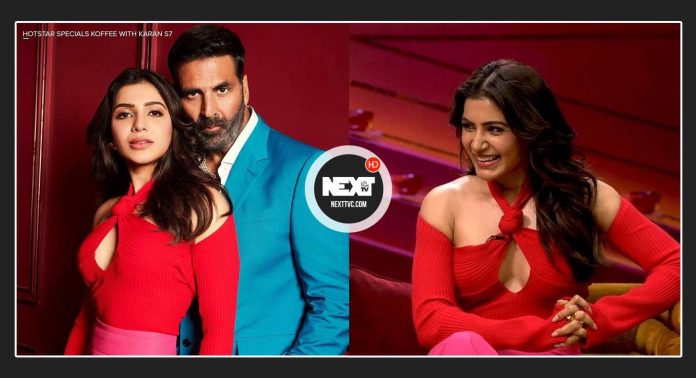Kangana Ranaut and Samantha Prabhu are the only female actors to sit down with Karan Johar on the Koffee with Karan couch. It’s brave of both of them to point out the hypocrisy of their powerful Bollywood host.
Prabhu interrupted Johar in the middle of the latest episode of the seventh season of the talk show to “pick a bone” with him. She told him, “You are the reason for unhappy marriages, on some level.” In part, because you’ve helped popularize the concept of marriage through advertisements for wedding gowns and music for the big day. You’ve portrayed life as K3G [Kabhi Khushi Kabhie Gham] since we were kids, and we remember that. In reality, it’s a case of K.G.F. ” But Prabhu had already said something that many millennials have felt at some point in their lives. The filmmaker burst into laughter.
If you compare the ‘6 din, ladki in’ line from Kal Ho Na Ho to Kuch Hota Hai, Karan Johar has done enough damage. It’s something we’ve all experienced at some point or another.
Like Saif Ali Khan, who sat next to Ranaut in Ranaut’s episode in Season 5, Akshay Kumar was taken by surprise when he saw Prabhu. Kumar attempted to lighten the mood by interjecting with humor. However, the arrow had already pierced the string. This wasn’t the only time she called him out on his hypocrisy during the show. “I don’t want to invade her personal space,” the filmmaker said at one point when talking about Prabhu’s previous relationship. Prabhu responded appropriately. This question has already been raised off-camera. She smiled as she said, “You mean you’re not going to ask in front of the camera?” she asked.
The “bravest” episode of Koffee with Karan would be the 2022 episode with Prabhu if the 2017 episode with Kangana Ranaut were weird.
What’s so brave about that?
Since then, Ranaut’s description of Johar as “the flagbearer of nepotism” five years ago has awakened an unwitting slumbering elephant. The use of the n-word was not a surprise. It’s been around since the dawn of cinema, but it wasn’t until Kangana Ranaut used it that it rose to the top of the year’s most popular list.
Shortly after Ranaut’s comments went viral, Karan Johar said in an interview that she should “leave” the film industry if she had that many problems with it. It would be an awkward situation if one of the most powerful filmmakers in your industry publicly rejected you.
Prabhu spoke for the millions of millennials enchanted by the cupid brewed at Karan Johar School of Romance, while Ranaut touched a sensitive and controversial nerve with her statement. With time, Prabhu has developed into one of India’s most successful female actors. A testament to her success can be seen in her Ormax rating, shown on the show. Johar’s scolding by an actor of her stature is no small accomplishment.
KJo’s movies have flaws.
Is it possible that you’ve grown up watching Johar’s family-oriented or romantic dramas? If so, congratulations!
As a young director making his feature film debut, Rahul ignores Anjali until she transforms into the stereotypical definition of what it means to be a girl: long hair, ethnic wear, and so on. For marrying someone he loved and leading Naina when he was not interested, Rahul was disowned in his subsequent film, Kabhi Khushi Kabhie Gham (2001). In his 2003 film Kal Ho Na Ho: “6 din, ladki in” (Six days to woo a girl).
And that’s not even mentioning the central characters in most of his films’ constant body shaming. Author Shrayana Bhattacharya claims that Shah Rukh Khan’s characters in romantic films of the 1990s “romantically ruined women—married, working, mothers” through their roles.
In a pathetic attempt at self-recovery, Karan Johar admitted that his film Kabhi Alvida Naa Kehna promoted divorce (2006). It is Prabhu’s turn to correct him: “Much later, when everything had already sunk.” I wholeheartedly concur.
